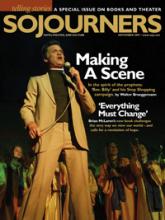Prelude: Live theater first enraptured me with a burst through the sanctuary doors of Ridgecrest Baptist Church in Blytheville, Arkansas, in the mid-1970s. My father, a volunteer youth minister, directed the youth group in a Passion play for Easter weekend. I tagged along to rehearsal each night for weeks, appointing myself Dad’s de facto stage manager and memorizing everyone’s lines.
In a clever bit of staging, Dad had “Peter” and “John” throw open the back double doors and race up the sanctuary aisle crying, “He is alive!” “He has risen!” Having seen all those rehearsals, each time I looked back and waited for Terry Watson and Joel Blakely to make their entrance. At their first performance on Good Friday, Terry and Joel sprinted in on cue, running and shouting, and an audible gasp arose from the congregation. Two pews in front of me, Mrs. Greene clutched at her heart and inhaled sharply, eyes wide in shock before a small smile crept across her face. It was almost as if the Good Lord himself had come through those doors.
I was hooked.
With these living, breathing characters in our midst, the air inside the church felt charged. Terry and Joel disappeared, and Peter and John sprang up in their places. Though neither of us would have put it this way, Mrs. Greene and I discovered something in that sanctuary: Theater is incarnational, an experience of word becoming flesh right before our eyes. In that sense, it mirrors the very essence of the Christian faith. After all, Jesus not only used parables, stories, and dramatic reenactments to convey his message—his very presence was the message.
Read the Full Article

